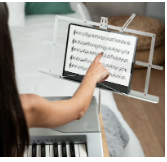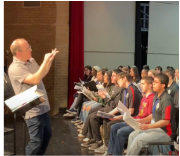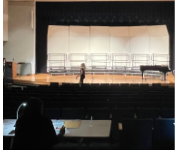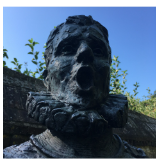The standards for High School Choral Music, Advanced Level enable students to build upon the skills and knowledge acquired at the intermediate level. As students perform choral works and sight-read music, they expand their performance abilities and creativity. Students continue to use a creative process to develop, compose, and refine personal choral music ideas, and to document research, inquiry, and analysis of a focused choral music topic of personal interest. Through the collaborative environment of the choral setting, students develop an understanding of teamwork and leadership skills. Students research career options in music and the variety of careers that involve skills learned in music. They investigate cross-disciplinary connections to identify how music works with other disciplines to develop innovative solutions to inquiry-based problems. Opportunities are provided for students to participate in local, district, regional and state events as appropriate to level, ability and interest. After-school rehearsals and performances are required of all students. Content in this course changes annually; therefore, this course may be repeated.
Audition and/or Director's approval
Essential Question: How do I evolve the musical instrument I was born with to express myself as a citizen of the global community?
|
Quarter |
Quarter 1 |
Quarter 2 |
Quarter 3 |
Quarter 4 |
|
Unit Title |
Welcome to the Vocal Agility Olympics |
Beyond the Notes: Artistry through Creative Nuances |
Receiving Feedback and Reflection for Growth as a Lifelong Learner |
Let My Voice and the Music Take You Away |
|
Image Cue |
 |
 |
 |
 |
|
Focus of the Story |
We begin the year building on our foundational music literacy skills while exploring the group dynamics of the ensemble. We use vocal warm-ups to develop further our vocal agility and range for application in our literature. |
The skills we continue to develop allow us to move beyond just singing the notes with opportunities to expand our artistic creativity while making music in rehearsals and performances. Reflection allows us to improve our blend and balance as an ensemble as the music becomes more challenging. |
Reflection provides the opportunity to give and receive feedback from peers while helping us to prepare for District Assessments. As an advanced ensemble, we continue to push our creativity while advancing our sight reading, composition and piano skills. |
Our year ends with more opportunities to perform and demonstrate our growth as musicians, including solo and group ensemble projects. Connecting our experiences with music history deepens our understanding of music's importance in the community and reveals opportunities for continuing participation and patronage of the arts. |
|
Transfer Goals |
Understand and apply creative processes to guide the development of ideas, original works, and musical performance. Analyze, interpret, and evaluate musical works from a variety of cultures. Use music literacy to demonstrate understanding of the elements of music and the ways they inform artistic performance and creative expression. |
Understand and apply creative processes to guide the development of ideas, original works, and musical performance. Analyze, interpret, and evaluate musical works from a variety of cultures. Use music literacy to demonstrate understanding of the elements of music and the ways they inform artistic performance and creative expression. Use technology as a strategic mechanism for improving music literacy and improving music performance. |
Understand and apply creative processes to guide the development of ideas, original works, and musical performance. Analyze, interpret, and evaluate musical works from a variety of cultures. Understand and find meaning in music as a form of community engagement through involvement as a performer, supporter, advocate, and audience member. Curate a portfolio of accomplishments, experiences, and performance materials exhibiting oneself as an artist. Use music literacy to demonstrate understanding of the elements of music and the ways they inform artistic performance and creative expression. |
Understand and apply creative processes to guide the development of ideas, original works, and musical performance. Analyze, interpret, and evaluate musical works from a variety of cultures. Explore and connect personal interests, experiences, and aspirations through vocation, advocacy, and arts patronage. Curate a portfolio of accomplishments, experiences, and performance materials exhibiting oneself as an artist. Use music literacy to demonstrate understanding of the elements of music and the ways they inform artistic performance and creative expression. Use technology as a strategic mechanism for improving music literacy and improving music performance. |
|
Learning Targets |
I can demonstrate proper rehearsal etiquette in any setting. I can cooperate and collaborate as a singer in a rehearsal. I can identify the components of a musical score. I can follow my part throughout a musical score. I can use both head and chest voice appropriately. I can correctly participate in vocal warm ups to develop vocal agility and range. I can sing an assigned vocal part in complex harmony consistently applying proper diction & choral techniques. I can compare and contrast styles of choral music using music terminology. I can read and count complex rhythmic patterns. I can conduct in a triple meter using expressive gestures, articulation, and various tempi. I can identify the effects of physiological changes and external influences on the voice. I can apply principles of vocal health while singing. I can prepare for an audition. |
I can evaluate a piece of music or performance using musical terminology. I can compare and contrast music performances. I can demonstrate collaborative skill in a variety of performance settings. I can discern personal preference and quality when evaluating and critiquing works of music and performances. I can aurally identify and perform all diatonic intervals of a Major and natural minor scales. I can listen while I sing and adjust my intonation, diction, dynamics, rhythm, and tone to contribute to a good choral blend. I can respond to a wide variety of conducting patterns and interpretive gestures. I can sing expressively using proper facial and physical expression. I can critique a music performance using musical terminology and critical thinking skills. I can identify all major key signatures. I can identify and explain musical structure by ear. I can interpret the components of a vocal score. I can play one octave major scale in any key on the keyboard. |
I can analyze and describe the cultural context of the repertoire we are studying. I can analyze and describe the historical context of the repertoire we are studying. I can use credible resources to obtain information about culture and history. I can compare and contrast a variety of musical periods and styles using music terminology. I can sight-sing eight-measures in multiple parts with solfege. I can independently sing major and minor scales using solfege. I can identify a variety of musical styles aurally. I can create a melody and add harmony. I can identify career options in music. I can use credible resources to obtain information about careers I can use credible resources to obtain information about the relationship of vocal music to other fields of knowledge. I can write eight-measure rhythmic and melodic phrases of increasing difficulty from dictation. |
I can give, receive and apply constructive criticism. I can create simple choreography individually or collaboratively. I can analyze and explain personal emotional and intellectual responses to works of music using music terminology. I can write simple eight-measure melodic phrases from dictation. I can perform music in two languages other than English. I can perform music with and without accompaniment. I can use choreography as a form of expression. I can compose a eight-measure rhythmic-melodic variation. I can document my progress. I can receive and give constructive criticism about compositions. I can apply ethical standards while creating original music. I can discuss the value of music to my community. I can examine opportunities for music performance and advocacy within the community. I can correctly notate my composition. I can play eight-measures of an exercise from SRF VA HS Level 2 (C, F, or D Major) |
